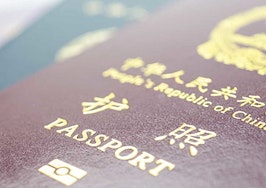The magic number is $28 billion — that is the amount of money that Chinese spent in the U.S. real estate market in 2014. And even more interesting is the anticipation that this sum is just the beginning of a larger wave.
Experts indicate that China is actively trying to liberalize its capital, which would enable Chinese citizens to move funds freely from China to foreign countries; this is currently restricted to a maximum of $50,000 per person per year.
It’s often difficult for U.S.-based agents to fully understand the rationale behind Chinese interest in the U.S. real estate market. And it’s more complex to comprehend how to prepare.
As a team based in China, we are meeting almost 24 hours a day with Chinese citizens who are interested in buying U.S. houses. It is the topic of every lunch or dinner that we are having here, besides the recently booming Chinese stock market.
The main reasons for purchasing a U.S. house remain: investment, education and immigration.
Now let’s focus on how the process works for an overseas Chinese looking to buy a place in the U.S. and what role you can play in it.
Step 1: Chinese use connections.
As in many countries and cultures all over the world, having the right connections pays off. In China, it goes a step further. Connections are about the only thing that will work effectively.
An example is Mrs. Wong, who was introduced to us by an immigration firm here in China. Mrs. Wong was looking to buy a house in New York for her daughter.
After meeting with her several times and sharing information about New York, trends and listings that met her criteria, she quickly recommended us to three friends who were also looking to buy a property in the U.S.
There was no need for advertisements or expensive marketing. Face-to-face meetings and genuinely good insight are all it took.
Step 2: Chinese start the purchasing process of a U.S. property early.
Anyone looking to buy a house will think carefully about the different options, size, price, market and schools before putting down a hefty amount of money.
Overseas Chinese are no different, and they will look at many aspects. They tend to start early because prospective homes are a 12- to 15-hour flight away.
Mrs. Zhu approached us at one of our seminars in Shanghai. She was interested in buying a house in the U.S. for her child, who she said was going to study in America.
Confident that this lady was looking to purchase a property in the next six months or so, one of our team members asked about the schools where the child was applying.
To his surprise, the mother told him that she was only two months pregnant, but she wanted to start looking at options to buy a place.
Step 3: Build and maintain the relationship once the client arrives in the U.S.
After our team in China makes connections with the U.S. agent, the agent needs to make a good first impression when the client arrives to look at prospective homes.
Some clients prefer to be picked up at the airport, but others are fine to meet the agent at their hotel. In any case, the agent should be on time (it’s probably better to be early), dressed appropriately, prepared with a car to show them around and equipped with a well-outlined schedule.
The schedule should be translated in “Simplified Chinese” to score extra points, and throughout the viewings, it will be vital to share information about the city and, most importantly, the schools.
Education is and remains one of the key aspects within a Chinese family. Having knowledge about top-graded high schools, boarding schools and universities will make an excellent impression.
Mrs. Xu and her husband just returned from viewings in Los Angeles last month after meeting with us in Shanghai. She said, “I could not believe that I was able to meet such a professional and knowledgeable agent!”
This agent went all out by providing almost more insights on the schools in Irvine than the actual houses — and the client loved it.
Looking at the process outlined above, U.S. agents face a major challenge. Building a personal connection is almost impossible to do if you live across the planet from your client.
So how to tackle this challenge? Many agents who attend property exhibitions in China mention the lack of clients on these exhibitions, the high attendance fees, and the travel and time expenses involved.
Working with a team in China that has similar goals to your own can help mitigate the challenge of connecting with buyers. This will enable you to close deals in a cost-effective way and get a piece of the $28 billion (-plus) market.
Sam Van Horebeek is a director at East-West Property Advisors, a U.S. real estate advisory firm based in China. You can follow on Facebook and Twitter.
Inman Connect San Francisco is right around the corner — register now and save $200!



